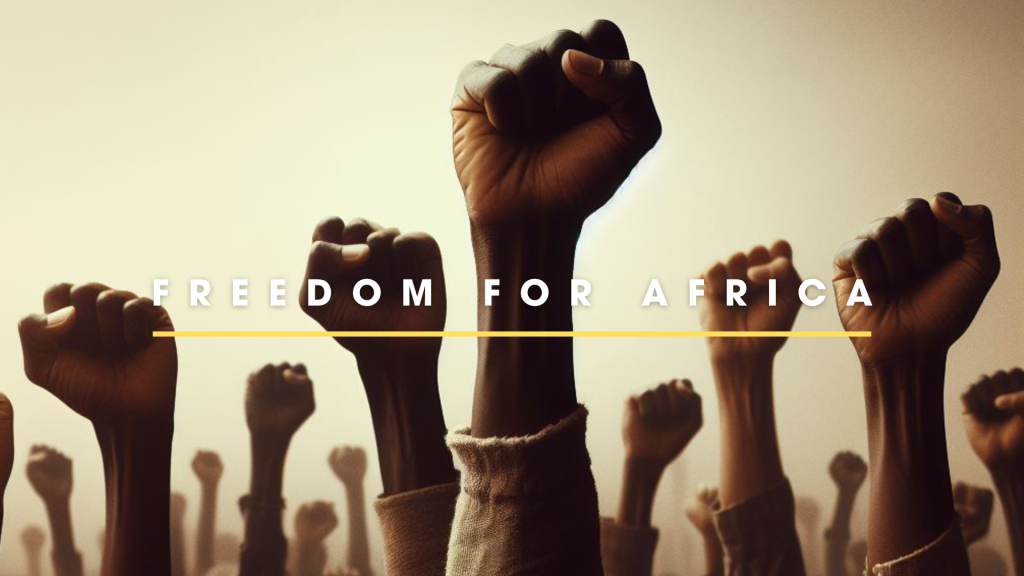–– Lennox Kalifungwa

Audio version of this article is available here: YouTube, Apple Podcasts, or Spotify.
Analyzing and Confronting Africa’s Self-Imposed Chains
In the tapestry of African history, the notion of freedom has often been miscast—a concept disconnected from truth and moral goodness. A pervasive belief has taken root, convincing many that true liberation equates to emancipation from whiteness and Western ideologies rather than a comprehensive freedom from sin and tyranny. This fixation on whiteness stems from postmodern Marxist theories that perpetually position white individuals as oppressors. This perspective has blinded many Africans to the stark reality: they remain unfree, and this bondage is self-inflicted. The pursuit of freedom, in its truest sense, has been supplanted by a fervent desire to eradicate whiteness and Western thought.
In the mid-20th century, African revolutionaries were seduced by postcolonialism which ushered in the pernicious philosophies of socialism, humanism, and communism– presented as indispensable weapons against colonial oppression. These ideologies were eagerly woven into the societal fabric of many African nations. For political leaders, this was a convenient redefinition of freedom through the lens of revolutionary Marxism, a tool to consolidate power and control. These ‘freedom fighters’ were celebrated as heroes who had thrown off the colonial yoke, heralding a new era.
However, the dawn of this new era quickly revealed its shadows. The adoption of these revolutionary ideas led to economic collapse, tyrannical regimes, civil strife, rampant corruption, and pervasive poverty across many African states. Despite this visible devastation, the reverence for these so-called freedom fighters endures. Instead of recognizing the internal sources of their plight, many Africans continue to lay the blame at the feet of historical colonialism.
Among the myriad concerns plaguing African nations, perhaps the most disconcerting is the pervasive sense of resignation and fatalism among their inhabitants. Many Africans hold the belief that civil governments are the ultimate arbiters of all matters and thus bear the responsibility to resolve every problem. This wholesale deference to ineffective civil authorities reveals a profound cognitive dissonance regarding the connection between belief and practice. Humanistic and socialist ideologies have taken deep root in the African psyche, largely unchallenged and unexamined. This has led to a deficient understanding of the impact of these ideas, with a tendency to attribute problems to external factors rather than recognizing inherent issues. While there has been no shortage of eloquent complaints, there remains a significant gap in accurately diagnosing the underlying causes of these problems and proposing holistic, well-founded, and effective solutions.
Christians must recognize that Africa’s challenges stem from a profound worship disorder. The failure to experience true freedom arises from a lack of reverence for God and a disregard for His commandments. There has been an exchange of truth for falsehood, beauty for utilitarianism, and goodness for the glorification of evil. This idolatry permeates society, leading to widespread destruction and a culture of death. Without the fear of God, genuine freedom will always remain out of reach.
The hope for Africa lies exclusively in Christianity, which proclaims a message of hope and redemption and fosters a culture of freedom and fruitfulness. Christ liberates and transforms sinners, providing newness of life and reconciling all things to Himself. He is the ultimate sovereign to whom all must bow. He has given us laws that safeguard our freedom.
True freedom and fruitfulness are found only in Christ. Freedom is not the license to do whatever one desires, but the ability to do what humanity was created and commissioned to do by God. It is within the bounds of God’s holy Law that freedom is realized. Contrary to popular belief, God’s law does not inhibit freedom; it restricts sin and disobedience. The first divine command to humanity, to abstain from the forbidden fruit, was less about the fruit and more about teaching obedience and illustrating the consequences of disobedience. Humanity was free to enjoy the garden’s delights, to use strength and intellect, to create, build, work, speak, steward the earth, worship, and relate to God and one another. This freedom was protected by a single restriction: do not disobey my command in order to enjoy and glorify me forever.
Christians in Africa are called to disciple the nations, teaching them to believe in Jesus Christ for redemption and to obey His holy Law (Matthew 28:20). Through adherence to Christ’s teachings, true freedom is established and preserved. Belief and submission to Christ lead to transformative freedom where tyranny is defeated, victimhood gives way to responsibility, life overcomes death, peace supplants strife, joy dispels fear, prosperity replaces poverty, integrity eradicates corruption, and construction triumphs over destruction.
The current turmoil in Africa presents a vast mission field for Christians to propagate a new worldview, law, and culture. There is an opportunity to disciple nations towards freedom and flourishing for the glory of God, even amidst apparent chaos.
Africa will not attain true freedom until sin and immorality are vanquished. It will remain enslaved to vice as long as idolatry persists and ignorance of the Truth prevails. Genuine freedom will only be realized through submission to God and adherence to His law.
Though Africa may not yet celebrate true freedom, through the faithful efforts of those who fear God and obey His commandments, the narrative does not have to persist in its conformity to contemporary cultural currents.
